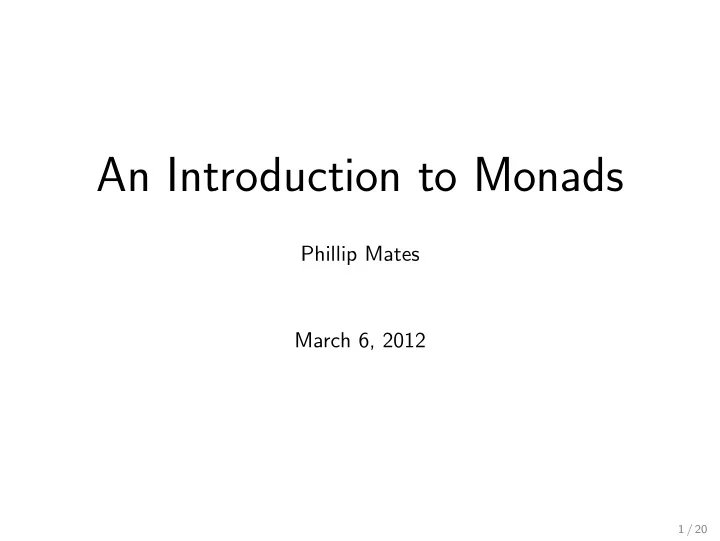

An Introduction to Monads Phillip Mates March 6, 2012 1 / 20
Why Monads? In a purely functional language: ◮ How do you encode actions with side-effects, such as reading and writing files? ◮ Is there an elegant way to pass around program state without explicitly threading it in and out of every function? ◮ How do you code up doubly nested for-loops? ◮ What about: Continuation passing style, Writing logs, Memory transactions. . . 2 / 20
What are Monads? They’re a very general abstraction idea that can be thought of as: ◮ containers that wrap values and are composable ◮ the inverse of pointers ◮ an abstraction for modeling sequential actions ◮ . . . 3 / 20
Error handling with Maybe data Maybe a = Nothing | Just a lookup :: a -> [(a, b)] -> Maybe b animalFriends :: [(String, String)] animalFriends = [ ("Pony", "Lion") , ("Lion", "Manticore") , ("Unicorn", "Lepricon") ] 4 / 20
-- Does Pony’s friend have a friend in animalMap? animalFriendLookup :: [(String, String)] -> Maybe String animalFriendLookup animalMap = case lookup "Pony" animalMap of Nothing -> Nothing Just ponyFriend -> case lookup ponyFriend animalMap of Nothing -> Nothing Just ponyFriendFriend -> case lookup ponyFriendFriend animalMap of Nothing -> Nothing Just friend -> Just friend 5 / 20
Monads are comprised of two functions -- Bind (>>=) :: m a -> (a -> m b) -> m b -- Inject value into a container return :: a -> m a 6 / 20
Maybe Monad -- (>>=) :: m a -> (a -> m b) -> m b Just x >>= k = k x Nothing >>= _ = Nothing -- return :: a -> m a return x = Just x 7 / 20
Using Maybe as a Monad monadicFriendLookup :: [(String, String)] -> Maybe String monadicFriendLookup animalMap = lookup "Pony" animalMap >>= (\ponyFriend -> lookup ponyFriend animalMap >>= (\pony2ndFriend -> lookup pony2ndFriend animalMap >>= (\friend -> Just friend))) 8 / 20
Using Maybe as a Monad -- or even better: sugaryFriendLookup :: [(String, String)] -> Maybe String sugaryFriendLookup animalMap = do ponyFriend <- lookup "Pony" animalMap ponyFriend’ <- lookup ponyFriend animalMap ponyFriend’’ <- lookup ponyFriend’ animalMap return friend 9 / 20
Threading program state type Sexpr = String -- naive generation of unique symbol transformStmt :: Sexpr -> Int -> (Sexpr, Int) transformStmt expr counter = (newExpr, counter+1) where newExpr = "(define " ++ var ++ " " ++ expr ++ ")" var = "tmpVar" ++ (show counter) 10 / 20
Generalizing the threading of state Let’s drop Int -> (Sexpr, Int) from transformStmt :: Sexpr -> Int -> (Sexpr, Int) and replace it with a more general type constructor: 11 / 20
Generalizing the threading of state Let’s drop Int -> (Sexpr, Int) from transformStmt :: Sexpr -> Int -> (Sexpr, Int) and replace it with a more general type constructor: newtype State s a = State { runState :: s -> (a, s) } transformStmt :: Sexpr -> State Int Sexpr 12 / 20
State Monad -- return :: a -> State s a return a = State (\s -> (a, s)) -- (>>=) :: State s a -> (a -> State s b) -> State s b m >>= k = State (\s -> let (a, s’) = runState m s in runState (k a) s’) 13 / 20
State Monad Example 14 / 20
What can be a Monad? Type constructors with an arity of one, for instance: -- this can’t because it has arity 2: ghci> :kind State * -> * -> * -- but these have arity 1: ghci> :kind (State Int) * -> * ghci> :kind [] * -> * 15 / 20
Deriving the list monad ghci> :type (>>=) (>>=) :: (Monad m) => m a -> (a -> m b) -> m b ghci> :type map map :: (a -> b) -> [a] -> [b] ghci> :type flip map flip map :: [a] -> (a -> b) -> [b] ghci> :type concat concat :: [[a]] -> [a] 16 / 20
The List monad models non-determinism return x = [x] xs >>= f = concat (map f xs) 17 / 20
The List monad models non-determinism return x = [x] xs >>= f = concat (map f xs) -- monadic powerset ghci> powerset = [1,2] >>= (\i -> [1..4] >>= (\j -> [(i, j)])) [(1,1),(1,2),(1,3),(1,4),(2,1),(2,2),(2,3),(2,4)] 18 / 20
Desugaring do Blocks do x <- foo === foo >>= (\x -> bar) bar do act1 === act1 >> act2 act2 19 / 20
Further Topics & Reading ◮ Monad Transformers ◮ “Real World Haskell” by O’Sullivan, Stewart, and Goerzen ◮ Corresponding blog post: quined.net/articles/monads.html 20 / 20
Recommend
More recommend